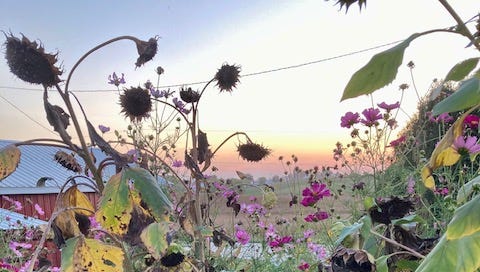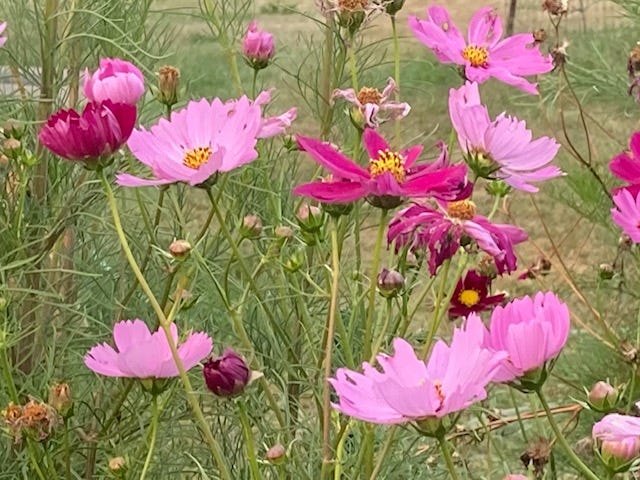A couple of weeks ago, the Yutzys persuaded me to pay one more visit to Bertha. She was stationed in a hospital bed in the living room of their grandpa house, surrounded by a sea of close relatives. Comatose, but still responding through the raising and lowering of her eyebrows, Bertha lay in a white gown on immaculate white sheets, a prayer cap on her head, the strings tied under her chin.
“Do you have your cell phone?” Abram asked me to dial his son’s number in Montana.
I dialed but the phone wasn’t ringing. “Is David waiting in his phone shack?”
“We told him five o’clock. He should be there with his wife Ruth.”
I moved about the house trying for a better connection. Finally, outside on the Yutzy’s front porch, the phone began to ring, and kept ringing as I moved back to Bertha’s bedside.
Connected, we all circled Bertha’s bed, and I held the phone to her ear.
“It’s David,” I told Bertha and her eyebrows raised.
Often I’m hindered on my way, burdens so heavy I almost fall.
Then I hear Jesus sweetly say, heaven will surely be worth it all.
David and Ruth sang in strong harmonizing voices, the hymn coming through the phone loudly and clearly.
Heaven will surely be worth it all, worth all the sorrows that here befall.
After this life with all its strife, heaven will surely be worth it all.
Bertha’s eyebrows raised and lowered, raised and lowered, almost in tempo with the music. The power of the hymn seemed to create a force that drew us in, all together, there in the room with the Saturday sun pouring through the window on a crisp early October day. No longer was I experiencing this transition at a distance, from around the corner on my own little porch. Here, I was part of the process, part of this beautiful music I’d heard all summer from the vocal cords of the neighbor families rotating through the farmstead to circle Bertha’s bed.
We had anticipated a July death, but July turned to August, August to September, and then early October. In the beginning when Bertha had entered hospice in May, the immediate family sang to her. Then as the whole process seemed to enter slow motion, a schedule was established, and neighbors loaded into their buggies. Three or four nights a week around eight o’clock in the evening, the singing floated over the slope. Sometimes, when the wind was blowing the wrong way and the air was heavy with humidity, I could just barely make out the music as if it were a faint hum on the horizon. But when the night air was still and clear, I could hear every word of the hymns and began to recognize the repertoire.
Toiling and pain I will endure, till I shall hear the death angel call;
Jesus has promised, and I’m sure, “Heaven will surely be worth it all.”
At Bertha’s bedside with my phone, I held back my tears, biting my lip. But Abram let loose my sorrow for me, with a soft cry that cut through the rhythm of the music. Quickly, he regained his composure, and David and Ruth sang on.
The Yutzys asked me to keep my cell phone turned on and by my bed that night. We all knew that the death angel would be calling soon. And sure enough, on Sunday morning, the hospice nurse said that Bertha had declined and the time was hours, not days, away. By Sunday afternoon, I was racing around the neighborhood, picking up Bertha’s children and grandchildren and transporting them to the Yutzy’s house. Most of Berth’as nine children lived within an hour’s drive, all but Daivd. He had already been to Iowa twice this summer. Two days one-way on the train with six children. He needed to get here again. But how would he and his family ever make it in time?
I took a swing around my neighborhood, picking up some of the family and taking them to the Yutzy’s, then it was off to Millerville, an adjacent neighborhood where everyone was named Miller for miles around and one of the Yutzy daughters had married into the clan. She and her husband were hosting a “sing,” where all the young people in the community gather to socialize and sing music. A huge tent had been erected, lit by lanterns, casting a glow on rows of benches. At least thirty buggies were already parked in the pasture.
I hopped out of the car, explained the situation, and told the Miller hosts to pack a small bag, leave the children with their grandparents, who were in attendance, and come with me. A few minutes later, we were off, barreling down the gravel road only to meet another Yutzy daughter and her husband driving toward us in a buggy. I did a U-turn on the gravel, charging down the road again, heading them off and squeezing them into my car. There was much talk of the grandchildren, the grandparents, and rigs. Who and what were going to have to go where.
The precious hours began to lengthen into days and a blur of phone calls. Bertha was still with us but her breathing had slowed. David had hired a van with two drivers. His family would drive non-stop, hoping to make it in time.
Up over the hills, around bends, down lanes split off from other lanes, I drove to farms I’d never seen before hidden in the nooks and crannies of ridges and hollows. I met Old Order Amish I didn’t know existed, peeking out of barn doors or milking parlors.
“We hated seeing your black car pull into the lane,” one of them told me later. “We knew what it meant.”
I raced throughout the area with young, non-English speaking Amish children in my back seat, staw hats plopped down on the heads of the little boys.
Grossdaddy? Grossmommie haus? Ja? I asked in the little Deutsch I thought I knew, gesturing for the children to get into the car. Sometimes the grandparents weren’t home and I had to search around for an aunt or uncle. Sometimes the aunts and uncles weren’t home either, and I had to leave the children with a chore boy, who often turned out to be an uncle. Finally, on the third day, I tracked down one of the aunts at work in the Amish grocery. She drove her buggy home, then I swept her up in my car and took her to the Yutzy’s main farm where the school-age children had begun to gather.
One neighbor brought in big stainless-steel pots of food. Another collected the laundry every morning and brought it all back clean in the evening. But with at least fifty people in the house at any one time, the Yutzys couldn’t keep up with the dishes and ran low on serviceware. I made a run for paper plates, paper napkins and coffee cups. I made another run for Kleenex and toilet paper, arriving just as David, Ruth, and their six children pulled into the lane from Montana.
His hands on his son’s shoulders, Abram greeted David with relief, then the family headed back into the house.
“I’m home, Mom,” David said at Bertha’s bed. “It’s okay. We’re all here now.”
Bertha’s breathing slowed even more, her eyebrows freezing in place.
Then by early evening, with all of the Yutzys gathered around, unified in their love of family and belief in God, witnessing, supporting Bertha and each other, the hymn singing gently, peacefully, faded out.
I am pleased to be a member of the Iowa Writers Collaborative. Please support these writers:







So beautiful, Mary. So right for you to be there helping to gather them all together. Such a holy passing.
Lovely. I felt so much like I was there, I got teary reading it. Godspeed Bertha.